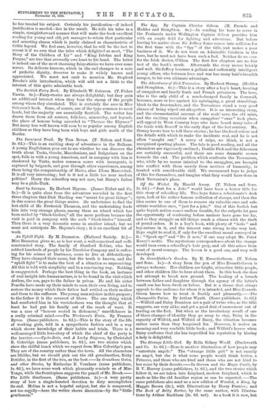An Uphill Fight. By M. Bramston. (National Society. 2s.)— Miss
Bramston gives us, as is her wont, a well-conceived and well- constructed story. The family of Stanford Robins, who has robbed hundreds of people by his Excelsior Company and is suffer- ing for his crimes at Dartmoor, come to live at Abbotsthorpe. They have changed their name, but the truth is known, and the "uphill fight" is to make the best of a situation so unpromising. All this is told with simplicity and in a convincing way. Nothing is exaggerated. Perhaps the best thing in the book, an instance of real insight into human nature, is to be found in the visit which Arthur, the son, pays to the father in prison. He and his sister Penella have made up their minds to earn their own living, and to restore the money which their father had settled on their mother and them to the sufferers. The young man rejoices in this purpose; to the father it is the severest of blows. The one thing which bad comforted him in his wretchedness was the thought that at least he had put his family out of the reach of want. It was a case of "honour rooted in dishonour," unselfishness in a really criminal mind.—The Workman's Train. By Frances Ryves. (Same publishers. is. 6d.)—This is the story of the life of working girls, told in a sympathetic fashion and in a way which shows knowledge of their habits and trials. There is a well-managed little love-story of which the chief of the party is the heroine.—Up-to-Date, and A Lucky Sixpence, by Christabel R. Coleridge (same publishers, ls. 6d.), are two stories which show the skilful touch which we expect from Miss Coleridge's pen. They are of the country rather than the town. All the characters are lifelike, but we should pick out the old grandmother, Betty Pettifer, in the first of the two, as the best.—In Grantham Gatcs, and other Stories, by Katherine E. Vernh.sm (same publishers, ls. 6d.), we have some work which pleasantly reminds us of Miss Yonge, while the frontispiece suggests the pencil of Mr. Brock.— The Little Gentleman. (Same publishers. ls.)—A very pretty story of how a single-hearted devotion to duty accomplishes its end. Melina is not a hopeful subject, but she is conquered, not too rapidly—here the 'writer shows discretion—by the "little gentleman."


































































 Previous page
Previous page